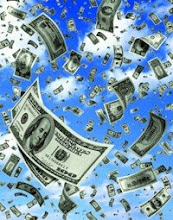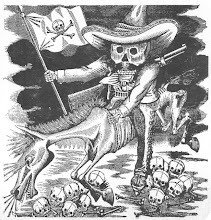I did have an economics class once in 1969. I made a good grade, but it was one of the classes that the University of Texas set up to make sure the football team kept its grades up. It was me and the National Champion Longhorns and we all made A's. Texas fight.
Nonetheless, you don't have to be a physician to notice that the surgeon cut off your healthy leg and left the one with gangrene.
This evening, allow me to restate the obvious: capitalism has failed to create a humane, even livable society for most people, and has produced a truly wretched society for many. Socialism has its own problems. Let's move to something that worked for a thousand years in Europe.
Let's discuss "distributism."
Belloc, Chesterton and Day are the most important proponents of distributism. Hilaire Belloc and G.K. Chesterton were two English Catholic writers of the early 20th Century. Dorothy Day was the American founder of the Catholic Worker of around the same time who supported distributism.
Belloc wrote that distributism was the system of private and collective ownership of land that had developed to support a just distribution of wealth during a 1000 years of Catholic influence in Europe. He did not view it as a new system, but rather, a return to a just system that had been replaced by the Servile State (the name of his book) that capitalism had produced. The introductory quotation in his book is:
". . . If we do not restore the Institutionof Property we cannot escape restoring
the Institution of Slavery; there
is no third course."
Chesterton in What's Wrong with the World describes the problems with capitalism by arguing the capitalists are against property:
I am well aware that the word "property" has been defied in our time by the corruption of the great capitalists. One would think, to hear people talk, that the Rothchilds and the Rockefellers were on the side of property. But obviously they are the enemies of property; because they are the enemies of their own limitations. They do not want their own land; but other people's.
Distributists, then, are defenders of property. But there is no right to have as much property as you want. The metaphor is marriage. Just because you are in favor of marriage does not mean you defend the right of a man to have as many wives as he wants. Nor should he have as many houses as he wants.
If King Solomon has a thousand wives, there must be nearly as many men without wives. Similarly, every billionaire has monopolized the wealth to sustain thousands. So people starve.
To modernize the argument. Saying Gates should be able to have all the wealth he can accumulate does not defend property any more than allowing him to round up a million women into a personal harem would defend the institution of marriage.
Dorothy Day endorsed the distributist society and in the Catholic Worker mission statement argued how to get there:
A complete rejection of the present social order and a non-violent revolution to establish an order more in accord with Christian values. This can only be done by direct action since political means have failed as a method for bringing about this society.The distributist economy would be a combination of private property and community property. It would be a return to the Christian economy of the Middle Ages. Belloc describes that earlier society like this:
There was common land, but it was common landThomas Storck argues (cited in the link under the title) that following the teachings of justice of the Church leads inexorably to distributism:
jealously guarded by men who were also personal proprietors
of other land. Common property in the village
was but one of the forms of property, and was
used rather as the fly-wheel to preserve the regularity
of the co-operative machine than as a type of holding
in any way peculiarly sacred. The Guilds had property
in common, but that property was the property
necessary to their co-operative life, their Halls, their
Funds for Relief, their Religious Endowments. As
for the instruments of their trades, those instruments
were owned by the individual members, not by the
guild, save where they were of so expensive a kind as
to necessitate a corporate control.
The justification of private property that the popes have made is always tied, at least as an ideal, to ownership and work being joined. Thus Leo XIII: "The law, therefore, should favor ownership, and its policy should be to induce as many people as possible to become owners" (Rerum Novarum, no. 35), and this teaching is repeated by Pius XI in Quadragesimo Anno (nos. 59-62, 65), by John XXIII in Mater et Magistra (nos. 85-89, 91-93, 111-115), and by John Paul II in Laborem Exercens (no. 14). If "as many people as possible...become owners," then that fatal separation of ownership and work will be, if not removed, at least its extent and influence will be lessened.The invisible hand snatches away food, housing and health care from those who need it. The traditional economies of Catholic Europe offered a better way.


























_-_Dante_And_Virgil_In_Hell_(1850).jpg)























































6 comments:
to quote the great contemporary thinker George Carlin, "Don't hold your farts tn, they travel up you spine and lead to shitty ideas".
In a letter to Engels Marx wrote the folling on January 21, 1982 "If the Russian revolution becomes the signal for a proletarian revolution in the West, ... the present Russian common ownership of land may serve as the starting point for a communist development."
It is a myth when that UT gradudate Poli Sci professor tells you Marx never intended his revolution to occur in Russia.(this was one of my professors who I had to reeducate after he was taught all bullshit - you should know at UTEP from day one they teach you to hate UT - at least in 1976)
Ed while I understand your point you missed a greater point - monetary wealth is a myth - its value is purely psychological. True wealth needs to be measured in terms of the tangible wealth of the nation.
Gates is an example of why redistribution of wealth for the sake of equality is really a falicy. I would trust Gates to use my tax dollars any day over the government or BISD when it comes to education. How much has his techonology improved the wellbeing of billions of people?
Marx understood what modern liberals seem to avoid at any cost - the key component is the people. There is both a social and economic component to the revolution.
This was the great tragedy of Stalin - he dismantled the naturally occuring social side of the revolution in the Russian villages known as obshchinas. He then imposed a state mandated sense of community. This is why it failed and neither socialism nor any form of communism was never even tried in Russia.
Bill Gates understands how by aiding the communities with education he is in fact helping himself. He is an example of how government should work.
Corporate American receives 200 billion in subsidies every year. They steal from the people with impunity. The problem is not the beneficial side of capitalism, the problem is most capitalists do not think in terms of the social obligations which come with being a successful corporation, such as Bill Gates - again the people.
In fact most people or administrators think of the social obligations which come along with being a successful society or at your job.
Revolutionary change can and will only come once the people are engaged to play their part and understand that their part includes social obligations to the whole while they pursue both their property wealth and fictious wealth in terms of money. Then and only then will meaningful change occur.
Thanks for the post - I have been looking for a venue for what I said for a long time. Maybe I will expand on this next week
Replacing Capitalism
With what? "Money to get power and power to guard the money" Medici family mantra. Having three popes in the family can also help when the downtrodden are being sold indulgences to comfort their souls.
One hundred year from now it will be something or someone else.
Pied-pipers are always going to be around, nothing is new under the sun.
When are people the most happiest?
ML
Ed,
You said ..allow me to restate the obvious: capitalism has failed to create a humane, even livable society for most people, and has produced a truly wretched society for many".
I say: Uhmm..no. Your original premise is patently false or at least subjectively so. I could drone on about it, but let's just say that to evaluate your idea, I will 'hypothetically" agree with you.
Distributionism was created by a church who practiced about the closest thing to distributionism that this planet has experienced. It was also formulated at a point in the churches history when its sphere of influence had diminished dramatically.
The Pope furthered the concept with a literal "can't we all get along" attitude while feeling the social and economic effects hat the enlightenment had on the church.
Before we move from this point and think ourselves backwards into pre-enlightenment days, let's recall if the 2nd largest religion in the world had experienced its' own ironic "evolution", we would likely not have many of the extremism issues we have today.
The redistribution of wealth geneally does not work well becasue for every Marx, there is a Lenin. For every Lenin, there is a Comrade Stalin waiting for an opportunity.
There are people who will engage in the socail contract who have no intetion of ever helping anyone but themselves. Even the birth place of distributionism had more than its' fair share of intrique and backstabbing. I still question the motives of the concepts authors.
These collective concepts will never do something that capitalism will do: provide motive to excel.
That motive has led ta world that essentially cut's the throat out of your original assertion about the evil's of capitalism.
This does not detract from the motives.. those are pure. It is the practical application that is the problem.
Even Mill Sr. and Jr. would admit that Utilitarianism would not make everyone happy.
Kurgan
Kurgan,
Very well said. But we still have the issue of the poor and unfortunate among us. They've been with us from day one and will continue throughout time. The Tanakh and Ed's cartoon caption speaks of Jubilee (Leviticus 25:9)
This is probably a good idea to apply in present times to our less fortunate.
Why?... I think that many social programs are abused and cause a perpetual cycle of dependency.
Where are we, on our third generation since the "Great Society" programs. Perhaps cleaning the slate and offering a new start would make more sense. Predatory lenders, payday loans, pawn shops, ect...are always a prediction of the state of the neighborhood.
I would imagine that prior to the 1960's the local churches and the neighborhood took care of their own.
Sure the poor and unfortunate will always be around, but we shouldn't count on any government ideology to remedy the problem.
ML
ML,
Of all the tests throughout history that have been tried, the only one is 100% self suffeciency and self containment.
You could have not external trade because eyou could not control the balance.
Ensuring that 100% of the needs are met might require compliance with social programs, which bring the oppresion back to square 1.
K
Post a Comment